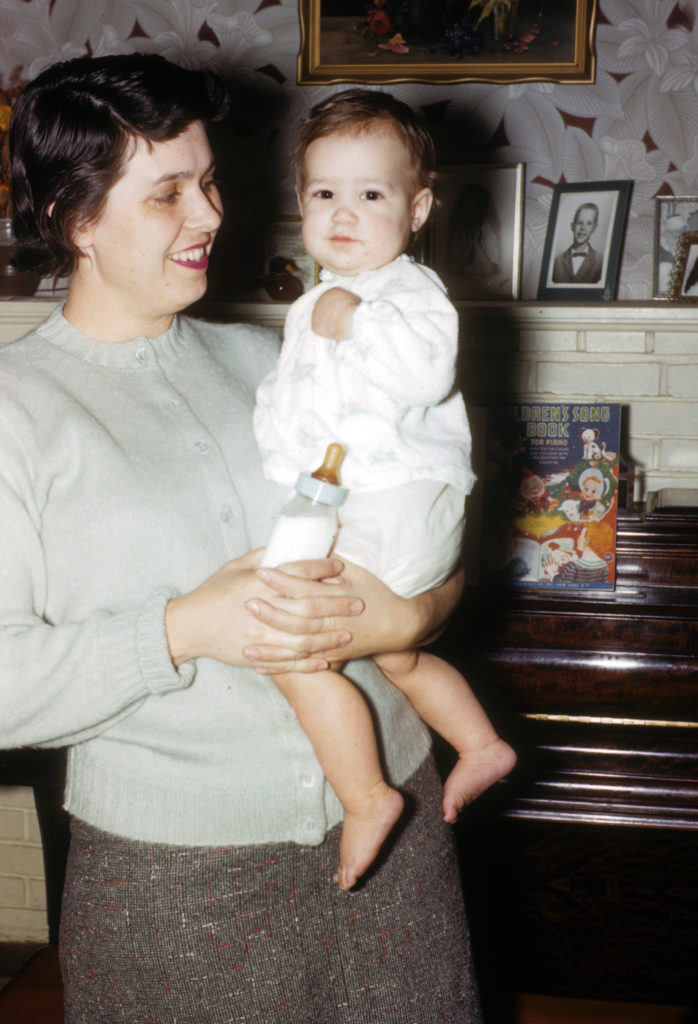Today’s post comes to us from gifted memoirist Jane Paffenbarger Butler. You can read more about Jane, below, but in the meantime, enjoy mining your memories for Story Sparks! – Julie
When I was a child, my mother and sisters and I spent hours making our clothes at home. The memory of those long quiet days together is etched in my mind because we did it over and over. That makes it a perfect resource for my writing because it is etched in my mind. But even one-time events can be seared onto our brains and serve equally as sources of inspiration.
Because we have kept a memory, stored it for some reason, it holds a significance that may be useful. When I try, I can remember many details and images about that repeating scene of sewing. Recording a memory, in writing, however disjointed or unclear or insufficient, means we capture whatever clarity there is to be observed. The overriding feeling of the sewing room was one of having to focus on the details, such as being sure of our measurements, even in our pinning, and whether the machine was threaded correctly and if we were following every direction. There was little conversation and there was little sound besides that of our movements.
However fuzzy, our memories are infused with feelings that give them an emotional power that can make our writng richer.
I may want to write specifically about sewing, the memories of the creaking old house, the stale state of the space we shared, the silence so thick I heard the buzz of a fly trapped at the window pane trying to escape. But I may prefer to let this description inform whatever other writing I do. These recalled images and ideas are newly acquired and because of their source resonate with authenticity.

The Prompt
Unlock Memories to Inform Your Writing
Tips
- Consider a memory that is etched in your mind, a scene or situation you have thought of before (for example: a sunny moment in a favorite swimming hole, an odd gift you always wondered about, or even the way your brother smiles when he sees you).
- Start anywhere, as if your memory is a disjointed dream you are reporting to a friend. Walk yourself through to whatever comes next regardless of logic. Allow the holes and lack of continuity. Just write. Write whatever comes to mind in order to tap into your subconscious author. Include the details in order to capture what your brain has stored. Press on further tying each recalled element to the next. Exhaust your memory so you can recall nothing more of it. Use stream-of-consciousness.
- Go back and focus on the smells and sounds and emotive quality of your memory. What is it about the memory that makes it special? Use the terms that fit the scene such as thread, tension, cut, and needle to help spur memories. Let one word spark the next.
- Once you have captured your memory, rework the prose to organize the ideas. Try putting them in some kind of order and add more details as they appear.
- Now examine your writing for interesting phrases or unexpected sentences, figurative speech and other useful elements that may emerge.
Mark and save these. Use your crafted memories as descriptive pieces, or to enrich other writing. For example, from my sewing memory I can write this sentence, “An urgent desire to leave swept over her, like a fly trapped at the window pane trying to escape,” or “They suffered the inability to coax out of one another any-colored threads whose combined tensions could bind them.”

Jane Paffenbarger Butler says her mother stocked their home sewing room so completely, she could pull together a dress or pants, a shirt or a skirt, in a week’s time from nothing more than an idea. She has been inspired to tell the stories of her unique childhood in a memoir, and at the West Chester Story Slam where she is a two-time winner. Learn more about Jane at www.myownpersonalsky.wordpress.com or at www.janebutler.org.
If you share you story somewhere (and here’s why you might not want to) post a link here so we can come and read it.
Did you write today? How did you get on? Who did you write about? Leave a comment!
